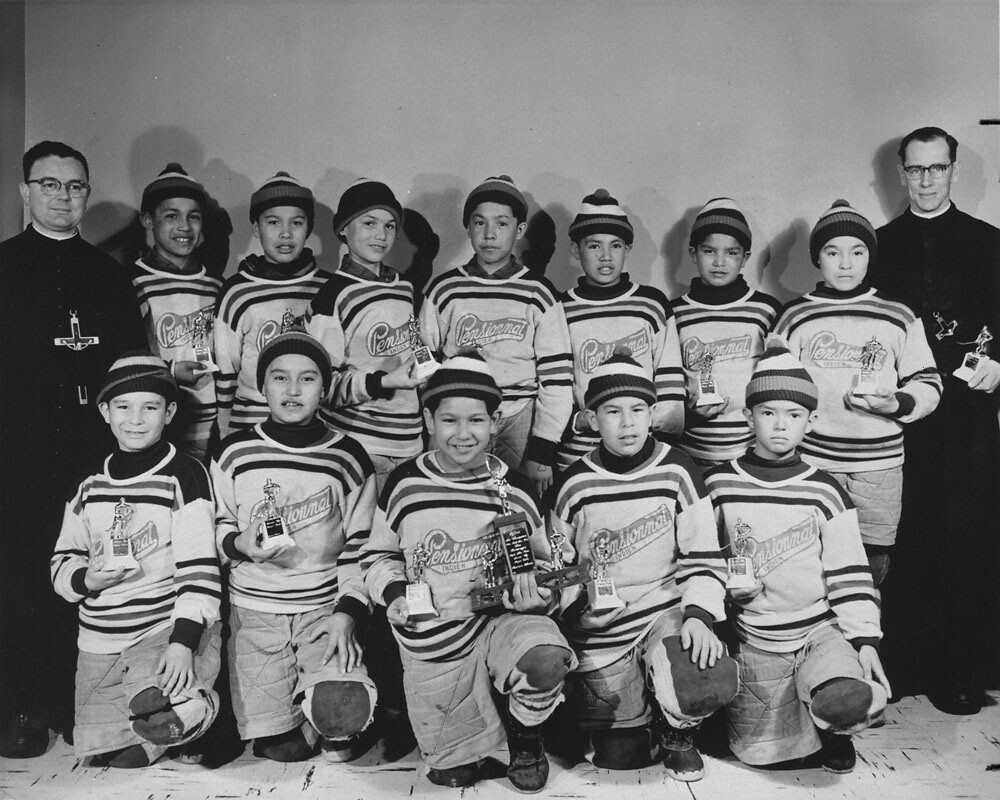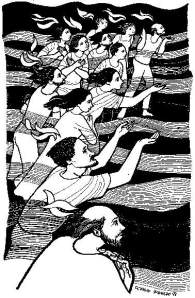There is great irony in the name of the commission that just released its preliminary report on the Indian Residential Schools in Canada: “The Truth and Reconciliation Commission.” It takes this name from the committee set up in South Africa to heal the wounds of apartheid.
But if apartheid was wrong, if segregation was wrong, if Nelson Mandela and Martin Luther King were right, then the residential schools were fundamentally the right idea. Justice Sinclair is defending the basic views of Bull Connor and Eugene Terreblanche, insisting that minorities must be kept separate from and treated differently from individuals considered members of the mainstream culture. Segregation now, segregation tomorrow, segregation forever.
 |
| Bull Connor monument, Birmingham, Alabama. |
I suppose you could say that Sinclair and his colleagues are entitled to their opinion. So, by the same token, were Terreblanche and Bull Connor. I would respond that it offends the fundamental tenet of human equality, which is also to say, it does not do unto others as you would be done by, the essence of all morality. But even if you grant that their opinion is honourable, there is yet something dishonourable about scapegoating the government, or “white people,” for in the past believing otherwise, as many Indians did (and no doubt do) too. That has to amount to pure racism: whatever one does is wrong, if one's skin is white.
Let us parse the alleged crime precisely. The Canadian government was under a treaty obligation to provide free education for native children. This was written in to the various “numbered treaties,” presumably at native insistence. So if this was wrong, who is to blame?
Perhaps this education should not have been compulsory. Some Indian parents perhaps did not like the idea. But in this, they were in exactly the same situation as any other Canadian parents, now or then. Schooling is compulsory for everyone.
Was it wrong to have this schooling sometimes (not usually) in residential schools, with the children living away from their parents? But this was a practical necessity. Indians tended and tend to live in small groups in remote areas, and often follow a nomadic lifestyle. How else are you going to do it; especially since few able teachers were eager to live in such great isolation? Was being separated from one's family, as many of these kids were, a great hardship? If so, it is a hardship that the wealthiest people in the UK and North America have always been eager to pay a premium for.
 |
| Students at a residential school, Chelmsford, England. |
Did the schools teach mainstream Canadian, and not native Indian culture? But why wouldn't they? Should government-funded Canadian schools teach a culture other than mainstream Canadian culture? This was the norm faced by any and all immigrants to Canada. Moreover, this is what the Indians themselves once wanted and understood they needed. Their traditional culture involved living by hunting and gathering. Besides being a hard-won, meagre existence punctuated by frequent mass starvation, it was no longer possible. The buffalo had gone. The land was being fenced in. Even if this were not so, Indians could see well enough that Europeans lived better than they did, and adopting European innovations like the wheel, the gun, the horse, the wool blanket, the steel axe, blazed the way to a better future. That was what the treaties were about: the Indians decided to switch to farming, and the government was to aid them in making this transition. In the schools, they wanted to be taught what they needed to know, not about things they already knew, or could learn better from their own elders.
 |
| Students and staff of St. Paul's Residential School, Manitoba, 1901. |
A lot of children died in the residential schools. The present commission says 6,000, out of a total of 150,000. This calculation can be disputed: previous estimates have been lower, and the commissioners include deaths of native adults after they left the schools. But let's even assume that the figure is accurate. We still need an estimate of deaths among native children remaining with their families over the same years to know whether the schools were a problem. The current report's own demands essentially admit that aboriginal home life even today is not an ideal environment for child health: it calls dealing with fetal alcohol syndrome a “high priority,” it warns of a problem with “family and domestic violence,” and it speaks of a need to “close the gaps between Aboriginal and non-Aboriginal communities in a number of health indicators such as: infant mortality, maternal health, suicide, mental health, addictions, life expectancy, birth rates, infant and child health issues, chronic diseases, illness and injury incidence.” Even if all this is merely due to a relative lack of nearby medical facilities, it still strongly suggests that residential schools were an entirely reasonable step on the grounds of child health alone.
There is the matter of sexual abuse. But again, to know whether the residential schools were the problem, we would need to compare the rate of child sexual abuse in residential schools with the rate in other schools and in aboriginal families. As we are learning more and more, terrible things happen in schools of all sorts. And even then, we have always known that the overwhelming majority of child abuse, and child sex abuse, takes place at home and at the hands of family members.
 |
| Students and staff of a Quebec residential school. |
This is not to say that terrible things never happened in the residential schools. They surely did. Any serious pedophile, as a matter of course, if he does not happen to have his own family, is going to gravitate to some school. The residential schools were also at peak operation during a period, the early 20th century, in which ideas of eugenics and racial inferiority were very much in vogue among “progressives”—no doubt including some of the government bureaucrats given responsibility for Indian Affairs. Just as they were prevalent in the Wilson administration to the south, not to mention regimes emerging later in Germany and Italy. Certainly, if guilty parties can still be identified, and in the unlikely event that the statute of limitations has not run out, the courts should do their job. Even government reparations might be called for.
But that is not the tone of the preliminary report we have seen. Instead, its tone is ethnocentric to well beyond the point of outright racism. It is, in other words, guilty of all the worst things of which it accuses others.
The best example is this choice bit, which I need only quote verbatum:
58. We call upon the Pope to issue an apology to Survivors, their families, and communities for the Roman Catholic Church’s role in the spiritual, cultural, emotional, physical, and sexual abuse of First Nations, Inuit, and Métis children in Catholic-run residential schools. We call for that apology to be similar to the 2010 apology issued to Irish victims of abuse and to occur within one year of the issuing of this Report and to be delivered by the Pope in Canada.
Where do I begin? What, exactly, might be meant by “spiritual abuse”? How is it that this committee constituted in Canada assumes jurisdiction over the Pope in Rome? Nor is it enough, either, to apologize for all the charitable work the Catholic Church did on the Indians' behalf, in times when without the Church's advocacy they would probably have been annihilated, when nobody else but the Catholic religious would accept the isolation required to educate them, when Catholic clergy alone made any effort to preserve their traditional languages. The apology is only good enough if the Pope makes it within one year, and on Canadian soil.
 |
| Residential school hockey team, Quebec. |
That passage alone surely ought to make any sensible person simply dissolve in laughter. But wait, there's more. Much more. In addition, the Catholic laity who donate their money to the Catholic Church are now required instead, and involuntarily, to fund native aboriginal religions:
61. We call upon church parties to the Settlement Agreement, in collaboration with Survivors and representatives of Aboriginal organizations, to establish permanent funding to Aboriginal people for:
...
iv. Regional dialogues for Indigenous spiritual leaders and youth to discuss Indigenous spirituality, self determination, and reconciliation.
No mention of the detail that indigenous spirituality commonly included slavery, torture, human sacrifice, infanticide, parricide, and cannibalism. Practices that most Catholics would probably not want to find themselves endorsing and funding from an ethical perspective.
 |
| Brazilian Indians practicing their traditional religion. The English word "cannibal" comes from the name of a tribe in the Caribbean. |
And then there is the matter of the Catholics' own schools:
64. We call upon all levels of government that provide public funds to denominational schools to require such schools to provide an education on comparative religious studies, which must include a segment on Aboriginal spiritual beliefs and practices developed in collaboration with Aboriginal Elders.
 |
| Mesoamerican Indians share and commemorate their traditional religious practices |
So despite the constitutional right of Catholics to have their own schools and to teach their own faith, they are to be forced to teach instead aboriginal religions to their own children, at their own expense as taxpayers, as approved by aboriginal leaders.
It may by now have occurred to you, as it does to me, that this report does not have the characteristic tone of a group that has become accustomed to either abuse or neglect. Just the reverse: these are people who expect even the Pope in Rome to snap smartly to attention. These are people evidently to the manor born.
And this is exactly right. Who are the Truth and Reconciliation Commission? Not a group of typical native Canadians; three prominent Indian tribal leaders. And the experience of Indian tribal leaders, since the original signing of the numbered treaties, has been opposite to that of the average Indian. They are an invested aristocracy. This is the real problem.
When the residential schools were set up, it was as a progressive solution to the problem of Canadian aboriginals. Indians were obviously doing poorly; in fact, facing imminent starvation.
They are still doing relatively poorly, if better than they were. But blaming residential schools for the problem is in the end nothing more than a very useful dodge to avoid fixing it. The Truth and Reconciliation Commission is looking for scapegoats. In this, they are following a path well-trodden by other corrupt elites: blame the outsider.
To illustrate: why is Mexico so much poorer than the US? The poverty, after all, starts right at the border, where climate, geography soils, not to mention the history of colonization and then independence, are all the same. Why are South Asians such world beaters the instant they get off the plane in North America and start school, yet South Asia itself seems to struggle so painfully to accomplish anything?
 |
| Left: USA. Right: Mexico. |
The economist Mancur Olson solved the riddle. The one remaining, but essential, variable is the level of corruption within the given ruling class. A selfish, non-meritocratic governing class can destroy anything.
To obscure their guilt and hold their power, ruling classes everywhere in the “Third World” these days are eager to blame “European colonialism” for all their local problems—when they are not blaming the poor for having too many babies. This is a good, solid red herring, although of course it grows less and less plausible with each succeeding year. Besides distracting attention from their own terminal venality, it allows them to shake down the guilty liberals of the richer nations of Europe for foreign aid, which mostly of course ends up in their own already amply-stuffed pockets. It plays best in cultures that are themselves rather xenophobic, hence prepared always to rally to the flag and believe the worst of foreigners.
 |
| North vs. South Korea at night, seen from space. |
The leaders of Canada's native people play the same game. The great majority of their proposals do nothing to help any ordinary native Canadians, but instead guarantee more pay and more power for an Indian bureaucratic elite: new graduate programs in aboriginal languages and cultures at universities. Annual studies and progress reports on absolutely everything. Everything to be done “in consultation with Indian elders.” Ordinary Indians tend to be suckers for this tactic, because few cultures are more truly xenophobic, or to be less polite, racist, than the Native Canadian ones. For most of them, the same word is used for their self-identification as a tribe or “nation,” and for “human being.” In other words, anyone who is not a member of the tribe is not human.
Little wonder, then, that the Indian leaders want badly to preserve this culture; it is a bulwark of their power. Little wonder, too, that they reserve their special hate, and most outrageous demands, for the Catholic Church. First, because it preaches directly against this idea, and second, because it is their most dangerous rival for the allegiance of their subjects. If my own experience is representative, I find the average Canadian Indian to be an unusually devout Christian. In this, as in so much else, the culture, outlook and interests of the Indian ruling class are very different from those of the ruled.
The best thing that could be done for the interests of Canadian Indians would be to get rid of this corrupt ruling class. Unfortunately, much of their power is enshrined in treaties. In the meantime, the worst thing that could be done would be to follow the recommendations of the Truth and Reconciliation Commission.
_Church.jpg/402px-Emanuel_African_Methodist_Episcopal_(AME)_Church.jpg)























